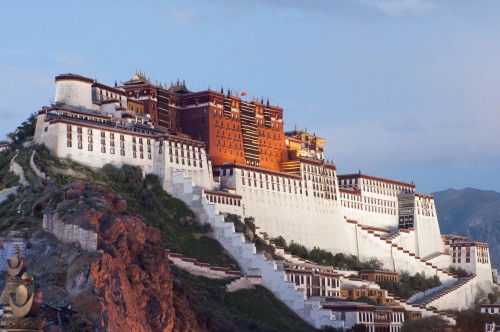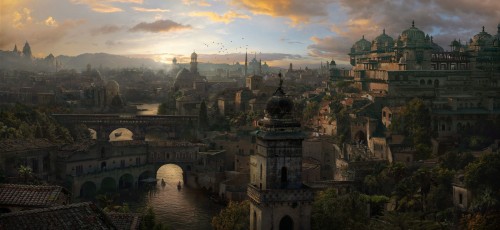The Bottomless City, the Eternal Colony, the Red Jewel, and a dozen other appellations apply to the city of Cach. The original census records and founding charter were lost long ago when the city was sacked, but legend has it Cach was the result of five separate settlements colonized by ancient civilizations beyond the Great Sea. All five were wracked by famine, plague, hostile natives, and ravenous monsters until only a few dozen survivors remained. They banded together atop Burkant Hill, where they erected a sturdy rampart, drove a well deep into the earth, and clung together for dear life. Half of them died during the first five years, but nearly twelve hundred years later their desperate fort has grown into a mighty citadel overlooking a vast, dense city with sturdy walls, fearsome armies, and a bustling port.
The city states of Bektemir, Hamza, Mirobod, and Sergeli were all originally outposts of Cach that have since won for themselves political independence. The nobles of Cach have a long history of infighting, and many of its Lord Mayors have spent their entire reigns focusing their attention inward. This leaves its satellite cities to their own devices. While now fiercely independent, these smaller states look to Cach as an economic and cultural center, and each maintains active embassies here.
Cach is situated around a hill overlooking Olmazar bay. An artificial harbor and series of lighthouses provide shelter for a fishing fleet and trade ships carrying exotic goods and passengers from far-flung lands. Canals cut across the delta plain of the Green River and through massive locks that double as the Northwest gates in the city walls. The inland hills are extensively terraced and irrigated by massive screw-pumps. The Cachic justice system and armies provide a steady supply of laborers for the great locks and pumps. Hundreds of craftsmen and professionals ply their trade inside the city walls, operating mostly from small shops; there are no large-scale manufactories.
The national defenses consist of a fleet of mothballed war galleys and the Mayor’s Guard. Individual noble houses maintain their own cadres of soldiers. Technically only the Mayor’s Guard are allowed to bear military arms in public places, but entire neighborhoods fall within the property boundaries of some houses, and are heavily patrolled by private armies. There are currently two mercenary companies under contract with the Lord Mayor. A special dispensation exempts members of these companies from the city’s arcane and sometimes draconian sumptuary laws. The Lord Mayor is elected to a twelve year term by a congregation of representatives of the founding families. It is widely believed that the bona fides of many of these electors are the result of fabrications and that nearly all of their loyalties are bought and paid for by a deep and broad network of special favors, blackmail, and bald-faced cronyism. It is considered extremely uncouth for an elector to ever stop backing a Lord Mayor he has previously voted for; the elections are nearly always a formality, the results known long in advance.
The city-state Abadan lies roughly one hundred thirty miles north by northeast along the coast, connected by caravan roads and sea lanes. The nation of Konjikala is a hundred miles south, separated by the Leviathan Channel. Sea trade between these three is frequent, and each has been known to raise massive navies for use against each other. Konjikala recently lost a war against Abadan and is burdened with reparations and tribute. Their official delegation to Cach goes to great lengths to conceal how thin their budget has stretched.

